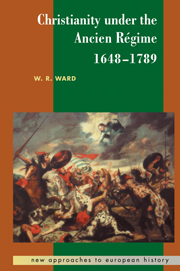Book contents
- Frontmatter
- Contents
- List of maps
- Preface
- Glossary
- 1 Peace and conflict: church and state in central and north-western Europe
- 2 Christianity in southern Europe
- 3 Catholicism in the Holy Roman Empire and the eastern Habsburg Lands
- 4 The religion of Protestants
- 5 Revival moves to the west
- 6 The Enlightenment and its precursors
- 7 The Churches in northern and eastern Europe
- 8 Religion after the Seven Years War
- Suggestions for further reading
- Index
- Title in the series
6 - The Enlightenment and its precursors
Published online by Cambridge University Press: 05 June 2012
- Frontmatter
- Contents
- List of maps
- Preface
- Glossary
- 1 Peace and conflict: church and state in central and north-western Europe
- 2 Christianity in southern Europe
- 3 Catholicism in the Holy Roman Empire and the eastern Habsburg Lands
- 4 The religion of Protestants
- 5 Revival moves to the west
- 6 The Enlightenment and its precursors
- 7 The Churches in northern and eastern Europe
- 8 Religion after the Seven Years War
- Suggestions for further reading
- Index
- Title in the series
Summary
Public and private anxieties
The Catholic missions and even Protestant revival touched very considerable numbers of people; elite movements, dependent on literacy or even scholarship, were mostly conWned to universities, towns, and religious orders. Even in 1750 the Enlightenment is said to have affected less than ten per cent of the population. Nevertheless, the anxieties which underlay the great atheism controversy which kept dons and clergy scribbling furiously in the late seventeenth and early eighteenth centuries were visible also in a newly swelling genre of private literary creation, the journals and diaries, the family books and autobiographies, of a much wider circle of the literate. The fact that these were mostly written with no view to publication (and the bulk did not see the light of day till the present century) adds to their interest. Published work tended to be much influenced by established exemplars like Plutarch's Lives; unpublished diaries did not much influence each other. At all events the seventeenth century gave birth to a great quantity of such material, more Protestant than Catholic, though including plenty of both, earlier in Germany than England, though less city-based in England than in Germany. The whole corpus was deeply marked by painful anxieties as writers sought to impose some order on their perceptions of a disordered world.
The key to the enigma, it appeared, was to relate events to the end-time and to show their providential significance to individuals and social groups.
- Type
- Chapter
- Information
- Christianity under the Ancien Régime, 1648–1789 , pp. 147 - 201Publisher: Cambridge University PressPrint publication year: 1999



